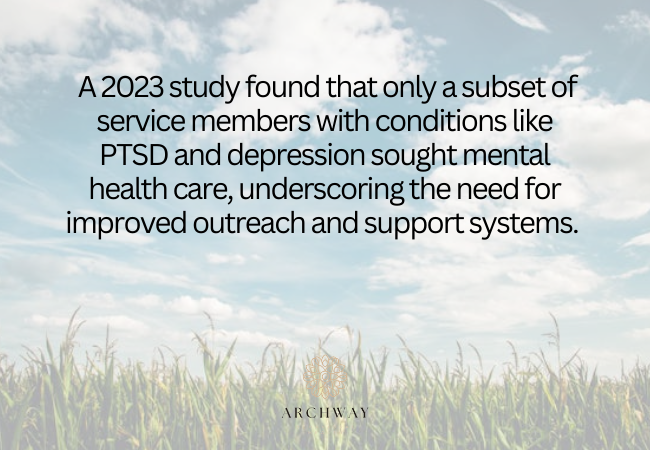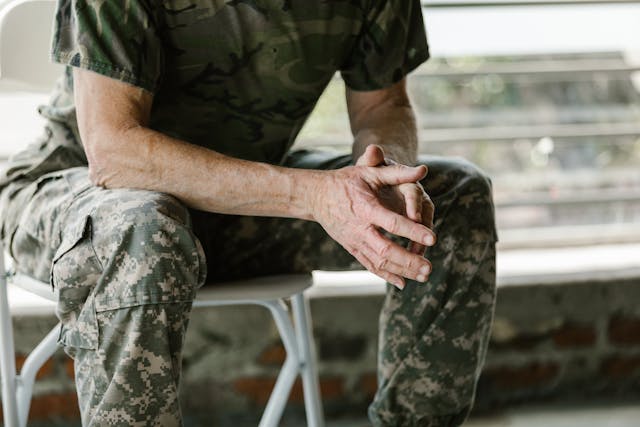Mental health challenges are pervasive in military populations, affecting service members, veterans, and their families. The intense pressures of military life, including exposure to trauma, separation from loved ones, and the demand for peak performance, significantly impact emotional well-being. Despite these challenges, the stigma surrounding mental health often prevents those in need from seeking help, leading to untreated conditions and further complications.
At Archway Behavioral Health, we aim to break this cycle by providing tailored Mental Health Treatments designed to meet the unique needs of military members. We address mental health challenges with compassion and evidence-based care.
The Mental Health Challenges Facing Military Members
1. Post-Traumatic Stress Disorder (PTSD)
- Prevalence: PTSD is one of the most common mental health disorders among military members, often resulting from combat exposure, life-threatening situations, or witnessing traumatic events.
- Symptoms: Flashbacks, nightmares, hypervigilance, emotional numbness, and difficulty trusting others can significantly impair daily life.
- Impact: Without treatment, PTSD can lead to substance abuse, relationship strain, and difficulties transitioning back to civilian life.
2. Depression and Anxiety
- Causes: Extended deployments, separation from loved ones, and the high demands of military life contribute to persistent feelings of sadness and worry.
- Symptoms: Loss of interest, feelings of hopelessness, restlessness, irritability, and sleep disturbances are common.
- Risks: Depression and anxiety often go unreported due to fear of stigma, resulting in worsened symptoms and lower quality of life.
3. Traumatic Brain Injury (TBI)
- Definition: TBIs, often sustained during training or combat, are linked to cognitive impairments and emotional instability.
- Symptoms: Difficulty concentrating, memory problems, mood swings, and impulsivity are common.
- Complications: TBIs often co-occur with PTSD or depression, complicating treatment and recovery.
4. Substance Use Disorders
- Connection to Mental Health: Many military members use alcohol or drugs to self-medicate untreated mental health conditions.
- Risks: Substance use often exacerbates underlying issues, leading to addiction and further harm to physical and emotional health.
Understanding Mental Health Stigma in the Military
Stigma remains one of the most significant barriers to seeking mental health care in the military. While initiatives to normalize mental health discussions have gained traction, much work remains to be done.
1. The Culture of Strength
- Expectation of Resilience: Military culture emphasizes toughness, self-reliance, and perseverance, leading many to view mental health struggles as a weakness.
- Self-Stigma: Service members may internalize these beliefs, preventing them from acknowledging or addressing their needs.
2. Fear of Professional Repercussions
- Career Impact: Many military members worry that seeking mental health treatment could harm their career, affecting promotions, security clearances, or deployment opportunities.
- Confidentiality Concerns: Fear of being labeled or judged by peers often discourages individuals from accessing available resources.
3. Lack of Education
- Unrecognized Symptoms: Many service members do not fully understand the signs of mental health conditions or believe their struggles are “not serious enough” to warrant help.
- Resource Awareness: Despite increased access to care, a lack of knowledge about treatment options remains a significant barrier.
The Cultural Expectations of Military Service and Mental Health
Military service is deeply rooted in values such as resilience, strength, and self-reliance. While these qualities are essential for operational success, they can create significant barriers to addressing mental health challenges. Service members often face immense pressure to perform at peak levels, both physically and emotionally, which can lead to feelings of inadequacy when mental health struggles arise.
1. Resilience vs. Vulnerability
The military’s emphasis on toughness and adaptability can make it difficult for individuals to acknowledge vulnerability. Seeking help may be perceived as a weakness, conflicting with the ingrained mindset of “pushing through” challenges.
2. Career Implications
Fear of career repercussions, such as losing promotions or deployment opportunities, deters many service members from accessing mental health care. This cultural stigma perpetuates the belief that seeking help could jeopardize their professional future.
3. Peer Judgment
In close-knit military units, concerns about being judged by peers for admitting to mental health struggles can prevent service members from speaking up. This lack of openness contributes to feelings of isolation and shame.
The Impact of Untreated Mental Health Conditions
When mental health conditions go unaddressed, the consequences can ripple across every aspect of a service member’s life, affecting their career, relationships, and physical well-being.
1. Professional Consequences
Untreated mental health challenges can lead to decreased performance, disciplinary actions, and, in severe cases, discharge from service. These outcomes not only affect the individual but can also disrupt unit cohesion and mission success.
2. Relationship Strain
Mental health struggles often extend to family and loved ones. Unmanaged symptoms such as irritability, emotional withdrawal, or substance use can strain relationships, creating cycles of conflict and disconnection.
3. Risk of Substance Abuse
Many service members turn to alcohol or drugs as a way to self-medicate their symptoms. This coping mechanism can quickly escalate into addiction, compounding the original mental health issues and creating new challenges.
4. Increased Suicide Risk
Untreated mental health conditions significantly increase the risk of suicide among military members. The stress of service combined with feelings of isolation and hopelessness can lead to devastating outcomes.
The Role of Family in Mental Health Recovery
The impact of mental health challenges often extends beyond the individual to their family, making family involvement an essential component of recovery. At Archway Behavioral Health, we emphasize the importance of family support in helping military members overcome their struggles.
1. Understanding the Challenges
Family members may feel confused or helpless when their loved one experiences mental health challenges. Education about conditions such as PTSD, depression, and anxiety helps families understand what their loved one is going through and how they can provide support.
2. Strengthening Communication
Mental health challenges often disrupt communication within families. Family therapy sessions focus on rebuilding trust, improving understanding, and fostering open dialogue in a safe, guided environment.
3. Providing a Supportive Environment
A strong family support system is critical for recovery. Family members play a vital role in encouraging their loved one to seek treatment and reinforcing the coping strategies learned in therapy.

Building a Future of Resilience and Wellness
Recovery from mental health challenges is a journey, not a destination. For military members, maintaining resilience and wellness involves ongoing effort and a commitment to personal growth.
1. Establishing Healthy Routines
Consistent daily habits, such as regular sleep, balanced nutrition, and exercise, provide a stable foundation for emotional and physical well-being.
2. Practicing Mindfulness
Mindfulness practices like meditation, deep breathing, and yoga can help manage stress, improve focus, and foster emotional balance.
3. Staying Connected
Isolation can be a significant barrier to recovery. Maintaining connections with peers, family, and support groups helps create a sense of belonging and accountability.
4. Engaging in Ongoing Therapy
Continuing therapy through programs like CBT Therapy and DBT Therapy ensures that coping strategies are reinforced and any new challenges are addressed promptly.
5. Setting Long-Term Goals
Having clear, achievable goals provides motivation and direction in recovery. Whether it’s advancing in a career, building stronger relationships, or pursuing new hobbies, goal-setting fosters a sense of purpose and accomplishment.
Effective Mental Health Treatments for Military Members
At Archway Behavioral Health, we offer comprehensive programs to address the complex needs of military members and their families.
1. Individual Therapy
- What It Involves: One-on-one sessions with licensed therapists provide a confidential space to explore emotions, process trauma, and develop personalized coping strategies.
- Benefits: Techniques like Cognitive Behavioral Therapy focus on reframing negative thought patterns, while Dialectical Behavior Therapy helps manage intense emotions and build interpersonal skills.
2. Group Therapy
- What It Involves: Facilitated sessions where participants share experiences, challenges, and successes in a supportive environment.
- Benefits: Group therapy fosters camaraderie and reduces feelings of isolation, which are particularly important for military members who often thrive in team-based settings.
3. Partial Hospitalization Program (PHP)
- What It Involves: PHP provides intensive care, including therapy, skill-building workshops, and medical oversight, while allowing participants to return home each evening.
- Benefits: This level of care is ideal for individuals needing significant support but who do not require round-the-clock supervision.
4. Intensive Outpatient Program (IOP)
- What It Involves: IOP offers flexible treatment schedules that allow individuals to balance therapy with work or family responsibilities.
- Benefits: Participants receive the structure and support needed to address mental health challenges while maintaining their daily routines.
The Role of Mental Health Treatment Centers
A dedicated Mental Health Treatment Center, like Archway Behavioral Health, plays a vital role in supporting military members through tailored care. Our experienced clinicians understand the unique stressors faced by service members, including the complexities of trauma, career pressures, and family dynamics.
Why Choose Archway Behavioral Health?
- Tailored Care Plans: Treatment is personalized to address individual needs, ensuring the best possible outcomes.
- Holistic Approach: We incorporate evidence-based therapies, mindfulness practices, and wellness strategies to promote comprehensive healing.
- Experienced Staff: Our team is trained to provide culturally competent care, respecting the values and experiences of military members.
Steps to Overcome Mental Health Stigma
- Normalize the Conversation: Openly discuss mental health challenges to combat misconceptions and promote understanding.
- Seek Peer Support: Sharing experiences with others in similar situations can reduce isolation and stigma.
- Take the First Step: Acknowledging the need for help is a sign of strength, not weakness.
- Access Professional Care: Programs like CBT Therapy, DBT Therapy, Individual Therapy, and Group Therapy are proven to help manage mental health challenges effectively.
Conclusion
Mental health stigma in the military remains a significant obstacle to recovery, but change is possible. At Archway Behavioral Health, we are committed to helping military members and their families break the silence surrounding mental health challenges. Through comprehensive care programs, including Partial Hospitalization Program, Intensive Outpatient Program, and evidence-based therapies like CBT Therapy and DBT Therapy, we empower individuals to heal and thrive.
If you or a loved one is struggling with mental health challenges, take the first step toward recovery. Contact Archway Behavioral Health today to learn more about our compassionate, tailored services. Take the step toward reclaiming your life and health—contact us at (888) 488-4103.
FAQ on Mental Health Stigma Among Military
Why is mental health stigma prevalent in the military?
Military culture often emphasizes strength and resilience, leading many to perceive mental health struggles as a weakness. Fear of professional repercussions and peer judgment also contribute to this stigma.
What are the most common mental health challenges among military members?
Post-Traumatic Stress Disorder (PTSD), depression, anxiety, traumatic brain injuries (TBIs), and substance use disorders are common mental health challenges faced by service members.
What are the consequences of untreated mental health conditions in the military?
Untreated conditions can lead to career setbacks, relationship strain, increased risk of substance abuse, and a higher likelihood of suicide.
How can therapy help military members with mental health struggles?
Individual Therapy provides a safe space to address personal challenges, while Group Therapy fosters peer support. Evidence-based treatments like CBT Therapy and DBT Therapy equip individuals with tools to manage emotions and cope with stress.
What is a Partial Hospitalization Program (PHP)?
A PHP offers intensive care for individuals needing structured mental health treatment. It combines therapy, education, and medical oversight, allowing participants to return home each evening.
What is an Intensive Outpatient Program (IOP)?
An IOP provides flexible treatment options, balancing structured care with the ability to maintain work or family commitments. It focuses on long-term coping strategies and recovery tools.
How does family involvement help in recovery?
Family involvement through therapy or counseling improves communication, rebuilds trust, and provides a supportive environment for the individual in recovery.


